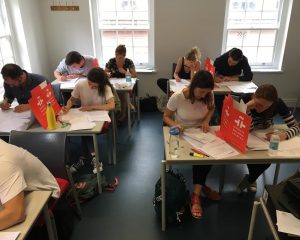Interest in Instituto Cervantes Teaching Accreditation Diploma (DADIC) continues to grow given increasing demand for learning Spanish in the United Kingdom
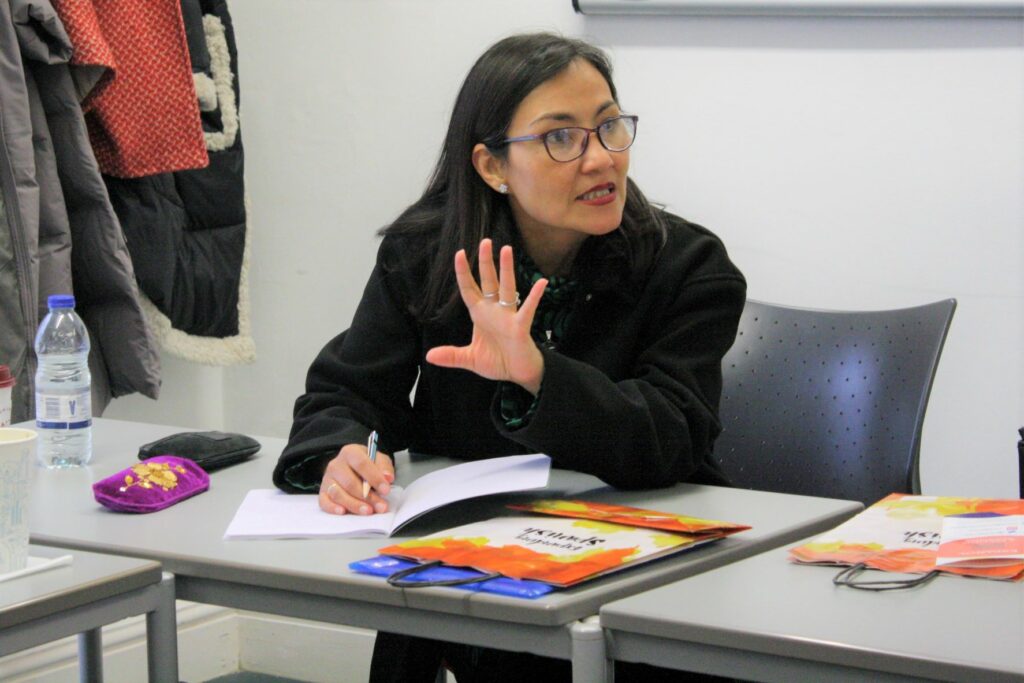
Instituto Cervantes London is training future teachers of Spanish as a foreign language through its preparation course for the Instituto Cervantes Teaching Accreditation Diploma (DADIC-A, autonomous level) within the context of an increasing demand for learning Spanish in the United Kingdom. A new group of students is about to complete the second module during the course’s fourth edition.
“The preparation course for the DADIC- A enables participants to teach Spanish communicatively, efficiently and professionally”, says Antonio Vañó Aymat, head of studies at Instituto Cervantes London. “Training new Spanish teachers in the United Kingdom is important to us. Spanish is one of the most studied languages in the country, and the demand for experienced qualified teachers of this language continues to grow”, adds Vañó Aymat.
“Training new teachers allows Instituto Cervantes to play a part in how Spanish is taught in the UK. We ensure high-quality teaching through a unique student-centred, action-oriented methodology. It combines theory and practice and is based on action, interaction and reflection to broaden future teachers’ skills and equip them with the tools needed to analyse and develop their professional practices”, the head of studies explains.
The course is aimed at those with no previous experience or training in teaching Spanish as a foreign language. A pleasantly surprising aspect of the fourth edition is participants’ level of education. They hold degrees in various fields: some have completed diplomas, Master’s degrees and PhDs in Education, Communications and Hispanic Studies, while others come from what are usually considered unrelated backgrounds such as engineering and business management.
“The level of education held shows that the high-quality professional training offered by Instituto Cervantes London attracts exceptional students seeking to improve their skills in teaching Spanish as a foreign language”, emphasises Vañó Aymat. Moreover, participants’ great interest and will to learn reflects “their commitment to teaching the language”. Students are from all over the Spanish-speaking world, which enriches and diversifies their learning experience.
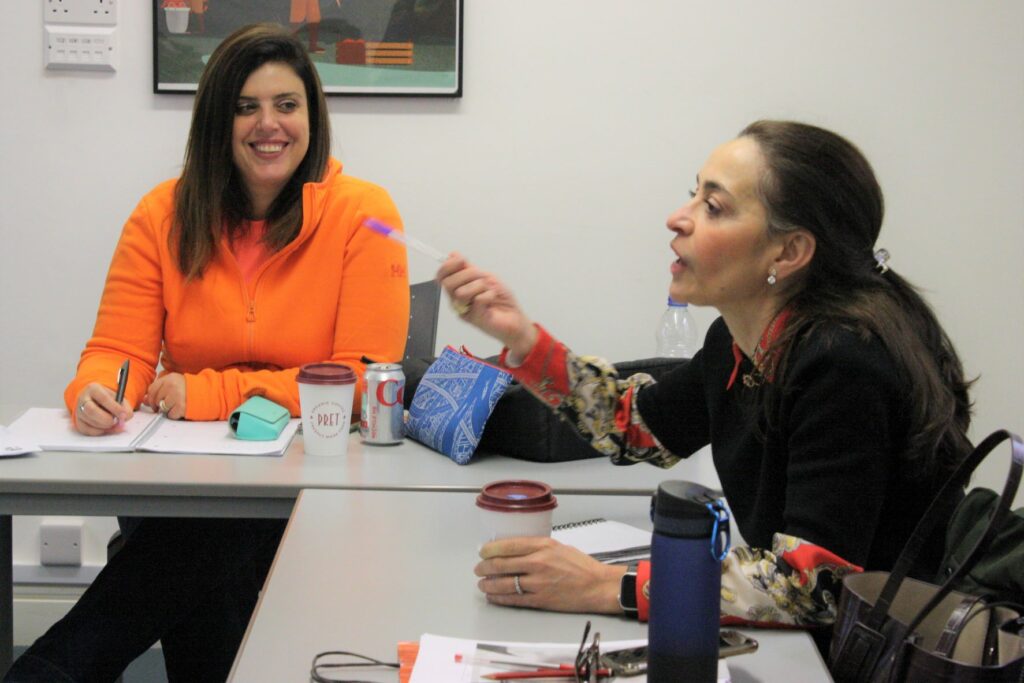
Increasing demand for learning Spanish in the United Kingdom
Venezuelan student Gitanjali Wolfermann, who has been living in London for just over five years, says, “I was pleasantly surprised by the increasing demand for learning Spanish in the UK, and especially by the desire to learn about Latin American culture. Here in London, I am far from home, but not my culture, which is inherently linked to my mother tongue, the language I think and feel in.”
In Wolfermann’s case, sharing her love for her language and culture is what inspired her to teach Spanish. “I chose the course because of its extensive curriculum and highly qualified, experienced teachers. I was also drawn to the combination of theory and practice”, she said.
Wolfermann also highlights that she and her fellow participants have been exposed to various levels, from beginners’ through to advanced. “This is not available everywhere, as a lot of the courses are online”, she notes. Another factor that persuaded her was the qualification achieved, which is certified by Instituto Cervantes.
“Many people think that being a native speaker of a language automatically means you can teach it. This is far from true. A teacher needs many tools and techniques to help students progress. It is no good teaching them isolated grammar rules or making them repeat meaningless phrases; it helps to build connections to better their understanding of the language and its rich culture”, Wolfermann highlights.
A very valuable experience
Jesica Paz, who is from Chile, wishes to become a Spanish teacher to work with students from diverse backgrounds, cultures and age groups. She wants to share her language and culture with them while also learning about theirs. She says, “I wanted to take the course to acquire new teaching tools and models that will help me improve the planning, development and analysis of the classes I give.”
In Paz’s view, taking the preparation course for the DADIC-A has been a “very valuable experience on both a personal and professional level”, as she has learnt new things that leave her better prepared for the future inside and outside of the classroom.
Paz highlighted that what she liked most about the course is that it has given her “new tools that will lead to greater professional development”, and she is certain that the qualification will open doors to the possibility of teaching Spanish anywhere in the world.
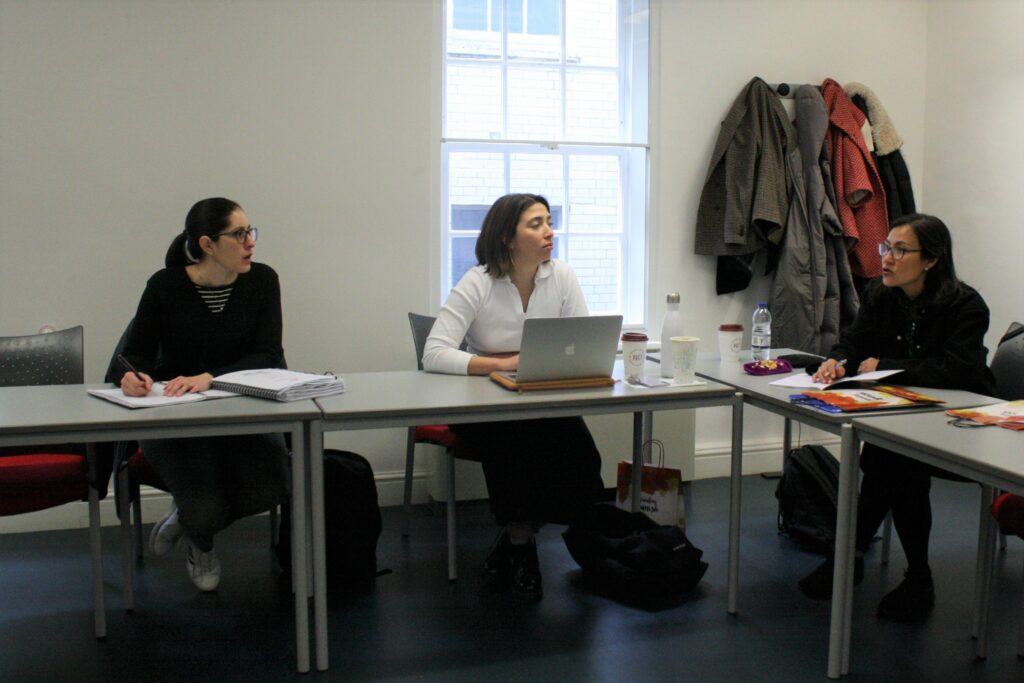
Taking the DADIC was the best decision
Student Milagrosa Villalobos, who is from Seville and has been living in London since 2011, began her journey as a Spanish teacher during the pandemic, when native speakers were needed to help Spanish A Level students prepare for their exams.
“After a few years helping young people learn and improve their Spanish, I decided it was time to formally train. Taking the DADIC was the best decision I could have made. The excellent course instructors have guided me in the right direction on my journey as a Spanish teacher”, explains Villalobos, adding that the course was “great from the start, in relation to both the learning experience and the instructors leading the course”.
A practical course to help develop teaching skills
Instituto Cervantes London has been offering this introductory course in teaching Spanish to adults since October 2019. It is aimed at those with no previous experience or training, and is divided into two modules, which focus on the early development of teaching skills and preparing for the DADIC-A.
Upon completion, teachers no longer require supervision. They are able to make decisions independently in relation to managing the language teaching, learning and assessment process.
Equally, they are well prepared to apply techniques and models learnt during the course and take risks with new approaches in the classroom. They are also able to adapt their teaching style to other contexts and will be able to critically review and improve their performance.
More information about the Preparation course for the DADIC-A
El interés por el DADIC, el diploma del Instituto Cervantes para profesores de español, sigue subiendo, dado el creciente interés por aprender español en Reino Unido
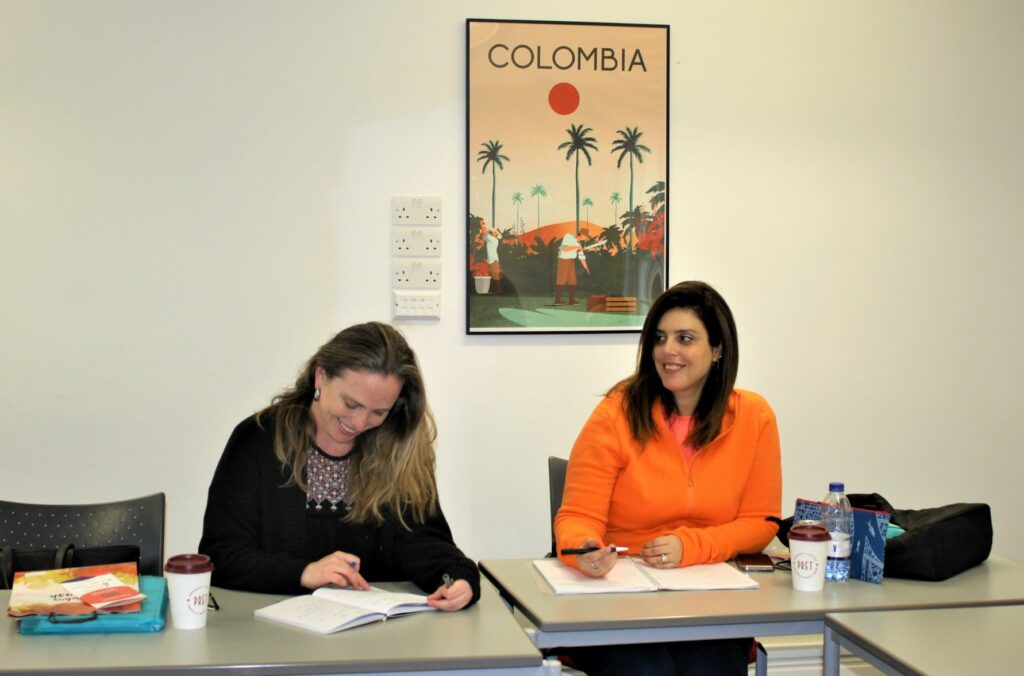
El Instituto Cervantes de Londres forma a futuros profesores de español como lengua extranjera mediante el curso de preparación para el Diploma de Acreditación Docente del Instituto Cervantes de nivel autónomo (en adelante DADIC-A), bajo el creciente interés por aprender español en Reino Unido. Un nuevo grupo de estudiantes completa ahora el segundo modulo de formación para el DADIC, que llega a su cuarta edición.
“El curso de preparación al DADIC-A capacita para dar clases de español de forma comunicativa, eficaz y profesional”, asegura Antonio Vañó Aymat, jefe de estudios del Instituto Cervantes de Londres. “Para el Instituto Cervantes de Londres, formar a nuevos profesores de español en el contexto del Reino Unido es una tarea fundamental. El español es uno de los idiomas más estudiados en el Reino Unido, y la demanda de profesores cualificados y con experiencia en la enseñanza del español como lengua extranjera es cada vez mayor”, puntualiza Vañó Aymat.
“Formar a nuevos profesores permite al Instituto Cervantes contribuir al desarrollo de la enseñanza del español en el Reino Unido y asegurar la calidad de esa enseñanza mediante el uso de una metodología propia, centrada en el alumno y orientada a la acción, que combina teoría y práctica -actuación, interacción, reflexión-, con el fin de desarrollar las competencias docentes de los futuros profesores y dotarles de herramientas que les permitan analizar y desarrollar su propio quehacer profesional”, añade el jefe de estudios.
Un aspecto que ha sorprendido –gratamente- en esta cuarta edición del curso de preparación al DADIC-A, que es un curso dirigido a personas sin experiencia ni formación previa en la enseñanza del español como lengua extranjera, ha sido el alto nivel de estudios de los alumnos que se han matriculado en él: licenciados en varias disciplinas, con diplomas, maestrías y doctorados en pedagogía, ciencias de la comunicación o estudios hispánicos, y también en campos inicialmente más alejados de la enseñanza del español como ingenieros o diplomados en gestión empresarial.
“Ese alto nivel educativo refleja cómo la formación rigurosa y de calidad que ofrece el Instituto Cervantes de Londres atrae talento, atrae a estudiantes excepcionales que buscan mejorar sus competencias docentes en el campo de la enseñanza del español como lengua extranjera”, recalca Vañó Aymat. Por otra parte, el gran interés y disposición por aprender que muestran los participantes de esta edición refleja “su compromiso con la enseñanza de la lengua”, toda vez que su perfil diverso -dado que provienen cada uno de un país diferente de habla hispana- permite una riqueza de perspectivas que enriquece la experiencia de aprendizaje de todos los participantes.
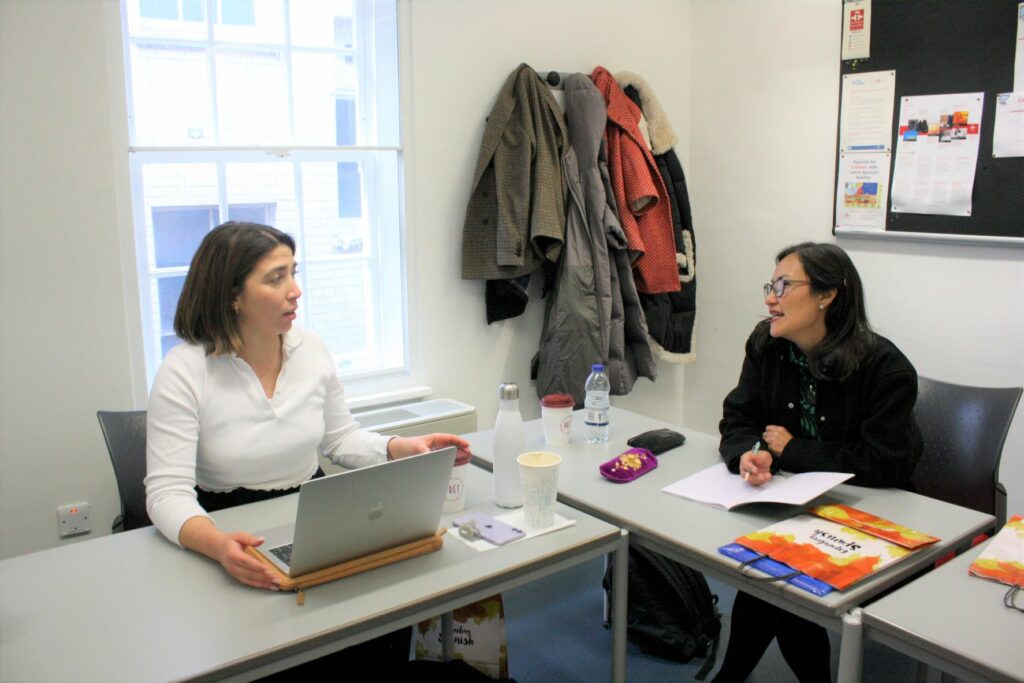
Creciente interés en el Reino Unido por aprender español
La estudiante venezolana Gitanjali Wolfermann, quien lleva poco más de cinco años viviendo en Londres destaca: “Me ha sorprendido gratamente el creciente interés en el Reino Unido por aprender español y en particular por conocer la cultura latinoamericana. En Londres estoy lejos de casa pero no de mi cultura, que está intrínsecamente ligada a mi lengua materna: idioma en el que pienso y siento”.
En su caso, compartir el amor por su idioma y su cultura es lo que la motivó a prepararse para enseñar español como lengua extranjera: “Como no podía ser de otra manera, escogí el DADIC del Instituto Cervantes porque su pénsum es muy completo y lo imparten docentes de excelente calidad, con años de formación y experiencia práctica en la enseñanza del español. También porque combina la formación teórica y práctica”.
Wolfermann destaca que han tenido numerosas oportunidades para practicar con cursos de distintos niveles, desde los más básicos hasta cursos avanzados. “Esa posibilidad no la brindan otros proveedores de formación, muchos de los cuales sólo ofrecen la modalidad en línea”, reconoce. La otra razón de peso para ella es la certificación que se obtiene: un diploma avalado por el Instituto Cervantes.
“Muchos creen que al ser un hablante nativo estás automáticamente capacitado para enseñar el idioma. Nada más lejos de la realidad. Son muchas las herramientas y técnicas didácticas que necesita un profesor para hacer progresar a sus alumnos. No se trata de enseñarles un conjunto aislado de reglas gramaticales, o de hacerles repetir frases sin sentido, lo que se busca es establecer una conexión que facilite la comprensión de la lengua y de la riqueza cultural que la rodea”, subraya Wolfermann.
El DADIC, una experiencia muy valiosa
A la estudiante chilena Jesica Paz, le interesa ser profesora de español para poder trabajar con estudiantes de diversos orígenes, culturas y edades, así como poder mostrarles y compartir su cultura e idioma y aprender de la de ellos: “Me interesa hacer el DADIC para generar nuevas herramientas y modelos teóricos de enseñanza que me ayudarán a mejorar mi planificación, desarrollo, análisis y mejora de las clases que imparta”.
Para Paz, hacer estos cursos de preparación al DADIC-A ha sido una experiencia “muy valiosa, tanto a nivel personal, como profesional, ya que he aprendido muchos conceptos nuevos, que me ayudarán en el futuro, no solo para dar y preparar clases, sino para la vida en general”.
Lo que más le ha gustado del curso es que le ha dotado de “nuevas herramientas las cuales me van a ayudar para generar un mayor desarrollo profesional”, para un futuro en el que se muestra convencida de que esta formación le abrirá puertas para poder enseñar español en cualquier parte del mundo.
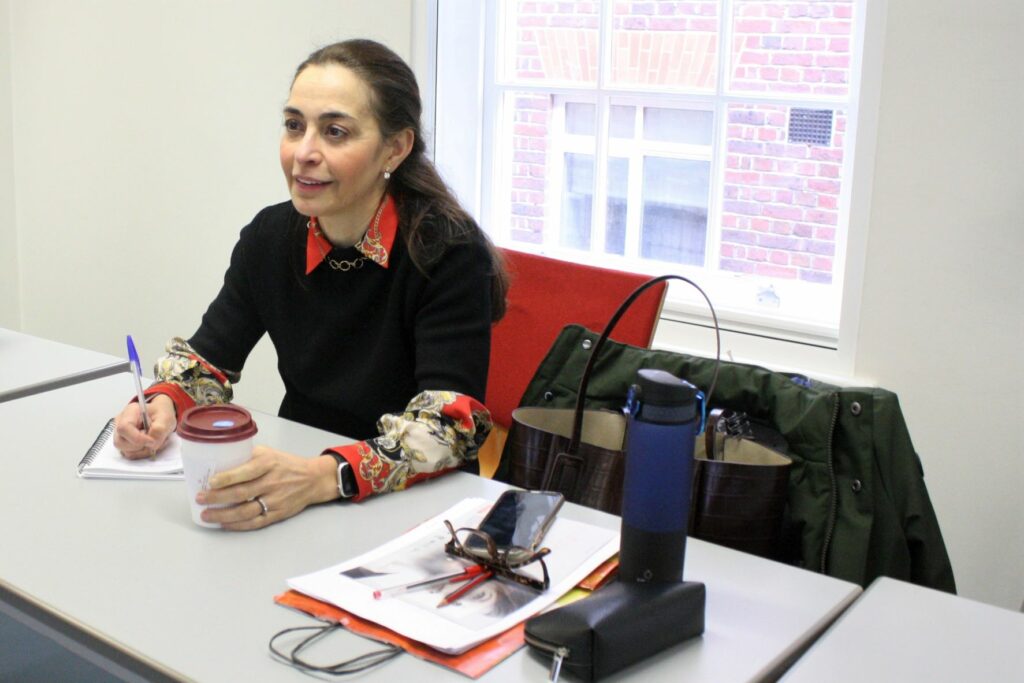
Optar por el DADIC fue la mejor decisión que pude tomar
En el caso de la estudiante Milagrosa Villalobos, natural de Sevilla y residente en Londres desde 2011, su comienzo como profesora de español llegó con la pandemia, cuando se necesitaban nativos para ayudar a los estudiantes de Spanish A-Leves para practicar los exámenes, en especial los orales.
“Después de unos años ayudando a jóvenes a aprender o mejorar su español, decidí formarme para que esta ayuda fuera más correcta y eficaz. Optar por el DADIC fue la mejor decisión que pude tomar, me ha dado la dirección correcta con los mejores profesionales para asentar mi camino como profesora de español”, expone Villalobos, para quien el curso ha sido “excelente desde el minuto uno, tanto por el aprendizaje, como por los docentes que lo han impartido”
El DADIC, un curso de carácter práctico para desarrollar las competencias docentes
Este curso introductorio a la enseñanza de español para adultos, que imparte desde octubre de 2019 el Instituto Cervantes de Londres, está dirigido a personas sin experiencia ni formación previa y está dividido en dos módulos, que cubren un primer estadio de desarrollo de la competencia docente y preparan para la acreditación docente del Instituto Cervantes (nivel autónomo).
Al finalizar este nivel, el profesor de español como lengua extranjera puede responsabilizarse de su propio grupo sin necesidad de un supervisor o tutor. Es autónomo en la toma de decisiones en relación con la gestión del proceso de enseñanza, aprendizaje y evaluación de lenguas.
Además, al finalizar el curso, el profesor estará capacitado para aplicar las técnicas y los modelos aprendidos en su formación y arriesgar con propuestas nuevas que lleva al aula en situaciones controladas. Dispondrá de criterios para adaptarse a otros contextos y será capaz de revisar de forma crítica su propia actuación y mejorarla.
Interest to learn Spanish increases: official DELE exams in may grow 21% in London
On May 24th and 25th, Instituto Cervantes in London will hold 2019’s first set of , the official Diplomas of Spanish as a Foreign Language (DELE) Diplomas. The enrolment in these programmes is at 163 students. This figure Spanish represents a 21% increase compared to the number of students that took the same exam on the same date in 2018.
The DELE Spanish Diplomas are official qualifications certifying the degree of competence and mastery of Spanish, granted by Instituto Cervantes on behalf of Ministry of Education and Vocational Training of Spain and, Ministry of Foreign Affairs, European Unión and Cooperation of Spain.
In the 2019 DELE applications, the most popular qualification is A2 (49 applications), followed by level B1 (29 applications) and the B2 test (24 applications). The DELE examinations are designed following the guidelines of the Common European Framework of Reference for Languages (CEFR) of the Council of Europe.
The Director of the Instituto Cervantes in London, Ignacio Peyró, said of the increase: “In a country that has traditionally had little attachment for certification, these figures are very positive. The DELE is a test of great quality, and its certification is very useful for curricular purposes – these are two keys to its success”.
Additionally, the DELE diplomas are a compulsory test for Sephardic Jews who are now able to claim Spanish nationality thanks to a new law. The Law introduced in June 2015 makes the acquisition of Spanish citizenship possible for the Sephardic Jews that are descendants of those expelled from Spain in the 15th Century without renouncing their current citizenship and without requiring residency in Spain.
This is the case of Andy, a British student with Sephardic Jew ancestry who took DELE exam in February to apply for the Spanish nationality. “After the Spanish government passed the Sephardic law, I looked into my family history and my family tree and I realized that I could ask for the Spanish citizenship. I had already studied Spanish at school, I travel to Spain frequently and I have many Spanish friends, so it was not difficult for me to pass the exam,” says Andy.
The Diplomas of Spanish as a Foreign Language (DELE) are official qualifications which prove the level of proficiency in the Spanish language and which are awarded by the Spanish Ministry of Education and Science. In short, these are the only qualifications in the world to prove fluency in Spanish.
What are the advantages of having a DELE qualification?
- They are official qualifications.
- They are recognised internationally by private companies, chambers ofcommerce and public and private educational organisations.
- In Spain, they give you access to universities, official language schools, business schools and jobs with the civil service.
- They are increasingly more in demand at universities in other countries.
- They are valid indefinitely: qualifications for life.
- They comply with the guidelines of the Common European Framework (MCER).
- They make it easier for you to work and study in other countries and also to obtain grants.
«Instituto Cervantes in London organizes specific courses for the preparation of DELE candidates and they are always very well received: there are courses once a week throughout the term, but also intensive courses in the weeks prior to each call,» says Pablo Martínez Gila.
Given the good reception of the diplomas, the Cervantes Institute in London reinforces the offer of DELE preparation courses for all levels with a wide range of options in May and July.
In addition to the May session, there will be more DELE 2019 exam sessions at the Instituto Cervantes in London on these dates:
– 12 July (written exam), 12/13 July (oral exam). Levels: A2, B1, B2, C1- Registration deadline: 16 May
– 13 September (written and oral exam). Level A2 – Registration deadline: 24 July
– 22 November (written and oral exam), DELE for Young Learners: Levels: A1, A2/B1 – Registration deadline: 9 October
– 23 November (written exam), 22/23 November (oral exam). Levels: A1, A2, B1, B2, C1, C2 – Registration deadline: 9 October
